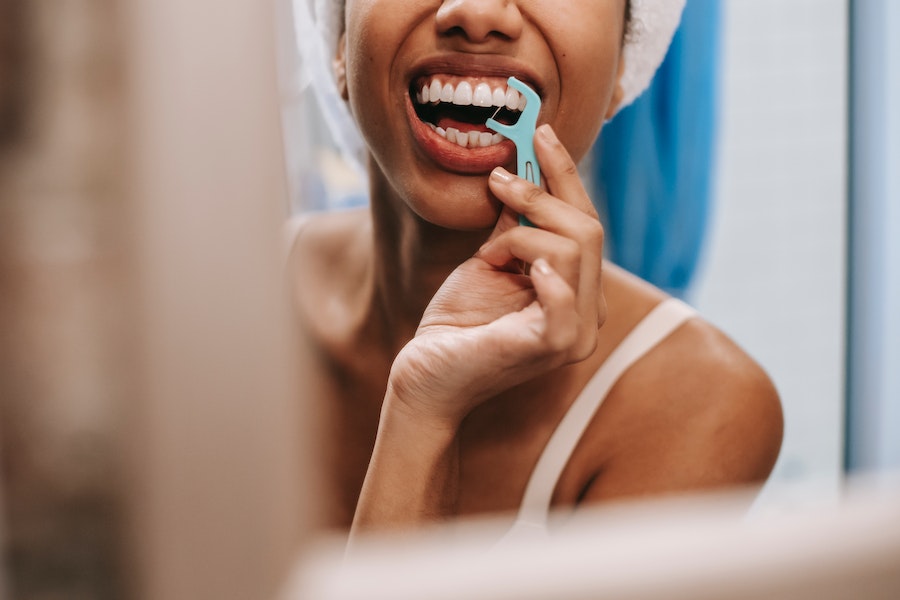Your Burning Dental Questions Answered
We asked all the things we never think to ask until there's a scraper in our mouth. Ten Top Dentists give us the tooth, the whole tooth.

How much should you really be flossing, anyway? / Photograph by Sora Shimazaki
Ever wonder how dentists care for their own pearly whites? Or why they can’t stop talking to you when your mouth is full of cotton balls and metal? Or what kind of toothbrush four out of five of them really recommend? We put a handful of our Top Dentists in the hot seat to answer all our burning dentistry questions.
The Truth About … Brushing
How’s this for an endorsement? All but one of the 10 dentists we asked use an electric toothbrush, which can be more efficient at removing plaque from teeth. The choice should be an easy one, Rittenhouse dentist Pamela Doray says, since electric brushes not only help keep your teeth cleaner but also help reduce staining, for a whiter smile. And who doesn’t want that?
When it comes to brushing frequency, all the dentists said they brush at least twice a day, with some brushing as often as after every meal. Last fall, a New York Times article highlighted the hotly debated topic of brushing before vs. after breakfast, but all the dentists we spoke to said they brush before (“Out of habit, and also as a courtesy to those I’m having breakfast with!” says Bala Cynwyd endodontist Eric Hodges), with some also opting for an additional post-breakfast brush or rinse.
Keep in mind that not only will you never get bonus points for brushing harder; you’ll probably do more harm than good, says Cherry Hill periodontist Michael Yasner, who surgically repairs gums damaged by too-vigorous brushing.
The Dental Care Even Dentists Are Afraid of
“A root canal! I tell my patients it’s the only dental procedure I haven’t had — yet,” says Rittenhouse dentist Shimma Abdulla.
The Foods and Drinks They Won’t Touch
Sticky candies and sugary beverages should be no-brainers for those trying to protect their teeth. But other no-no’s on our dentists’ lists include eating popcorn, snacking on dried fruit (which is sticky and sugary, similar to candy), chomping on ice (a cracked tooth waiting to happen), and even drinking lemon water (which can erode your enamel).
How Many Cavities They’ve Had
Only one dentist we spoke with claimed never to have had a single cavity. As for the others, one dentist pleaded the fifth (’nuff said), one said “many,” and another told us, “a bunch.” One said 20 to 30 and blamed the soda she drank as a child. Dentists — they’re just like us!
Flossing
Sure, dentists love to tell us to floss, but do they actually practice what they preach? All of the dentists we interviewed said they floss — Abdulla says she can’t sleep at night without flossing — and eight of the 10 said they floss every day. You’d better believe they can tell when patients don’t floss, too — and no, flossing on the morning of an appointment doesn’t make up for months of skipping this step. (“There are no secrets in the dental chair,” says Yasner.) The biggest tell is the state of your gums: “There is gum redness, swelling and bleeding in a patient who doesn’t floss regularly,” explains Bella Vista dentist Kristine Concepcion.
“I tell my patients that they don’t have to floss all of their teeth — only the ones they want to keep!” jokes Doray.
When it comes to which kind of floss you use — standard dental floss, a water flosser like a Waterpik, or floss picks — many dentists prefer the old-fashioned method: “Standard flossing technique, done correctly, is still the best way to remove the daily accumulation of bacteria and food debris,” says Yasner. And water flossers, which can be helpful in flushing out your mouth, are no substitute for standard flossing, according to Doray. (Plus, notes Bella Vista pediatric dentist Katharine Woehling, they can create quite the mess on your mirror.)
The Moments They’ll Never Forget
“The kids say the darndest things,” says Montgomery County pediatric and adolescent dentist Angela Stout. “There’s this one little boy whose parents are both physicians, a very bright little boy. I said to him, ‘What’s on your agenda today?’ And he said, ‘I don’t have an agenda, I have a penis.’ This is my everyday.”
Why They Talk to Patients Whose Mouths Are Full
“Because it’s a secret joke among us dentists,” quips Bucks County dentist Simon Oh. But on a more serious note, they’re actually chattering away in hopes of distracting patients from what’s happening in their mouths. Is it working?
What They’d Change If They Could
One of their biggest complaints is probably pretty similar to your own: how complicated and unhelpful dental insurance can be. Bucks County dentist Harshil Boghara calls dental insurance “the biggest scam there ever was.” It’s especially problematic when the insurance dictates patient care, rather than the dentist. “I would like for treatment decisions to be based more on patient needs and less on insurance-company algorithms,” says Abdulla. Woehling wishes the same, bemoaning that most dental insurance only covers cleanings every six months for kids, even though they experience phases of rapid development and could benefit from more frequent dental visits.
The Oral Health Mistakes They See All the Time
Turns out there’s plenty that patients do to harm their smiles: brushing too hard, skipping flossing, clenching and grinding their teeth, sipping sugary beverages like fruit juices and sports drinks, and, increasingly, vaping. “People don’t understand how bad vaping is for your oral health,” says West Chester dentist Nouman Bashir, due to ingredients that cause dry mouth. Another culprit? Gummy vitamins, which, just like sticky candy, can cause tooth decay.
Published as “Mouthing Off” in the March 2023 issue of Philadelphia magazine.


